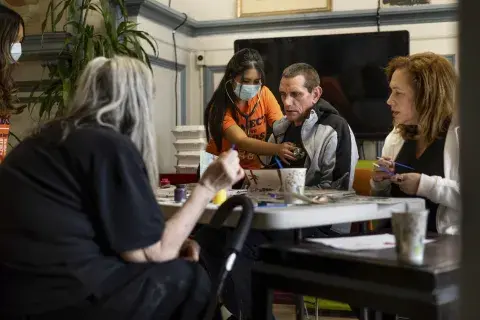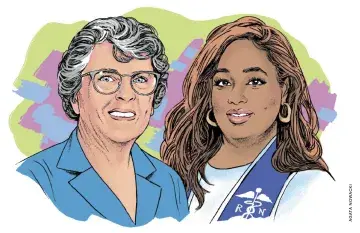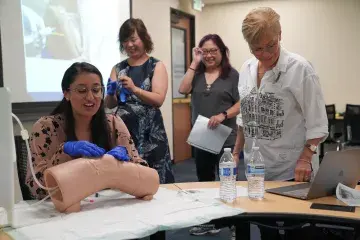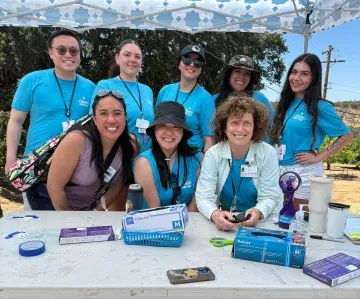Bridging a Medication Gap
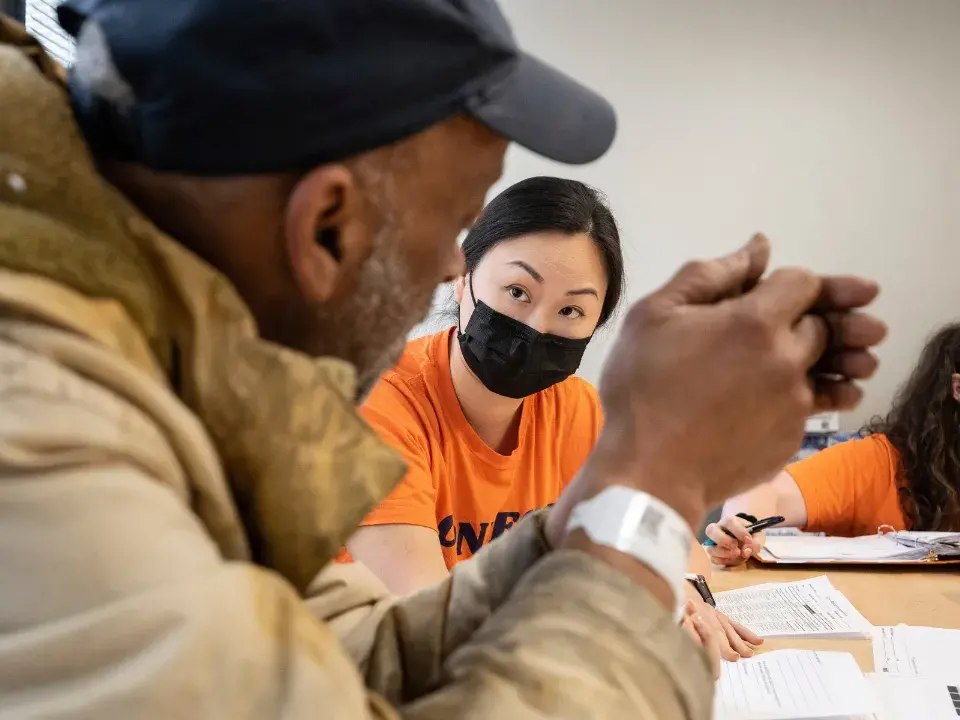
SMU nursing students ensure people who are marginally housed have the medications they need
During a routine on-site blood pressure check with a Samuel Merritt University student nurse last November, a patient mentioned that he hadn’t been feeling so good.
A resident of The Crosby, a hotel converted into single-room occupancy (SRO) supported housing in San Francisco’s Tenderloin district, said that he had been experiencing blurry vision, numbness in his fingers and toes, and excessive thirst. It quickly came to light that the patient, recently diagnosed with type 2 diabetes, had run out of his medication. A missed endocrinology appointment due to a fire on his floor at The Crosby, paired with blurry vision that made it difficult to do basic tasks like use his cell phone, had stymied his efforts to get his prescriptions refilled. Two student nurses were able to accompany their patient to the nearest urgent care clinic, where he received treatment for his dangerously high blood sugar of over 600. There, these student nurse advocates worked with the triage nurse practitioner to send direct messages to the patient’s endocrinologist and secure 90-day prescriptions for all his medications, reducing the need for repeat pharmacy trips and the risk of missed doses. They even stopped by the pharmacy to make sure there wasn’t any confusion on their way back to The Crosby.
BUILDING BRIDGES
In the spring of 2020, amid much reeling from the pandemic-era “new normal,” California Governor Gavin Newsom launched a first-of-its-kind initiative called Project Roomkey. With the highest rates of homelessness in the nation, California’s over 160,000 unhoused and marginally housed residents were especially susceptible to the rampages of COVID-19. Project Roomkey aimed to find housing for the most vulnerable of these people in vacant hotel rooms across the state, providing safe places to shelter and isolate for those especially susceptible or exposed to the virus, reducing crowding in already strained shelters, and effectively flattening the COVID-19 curve. Under Project Roomkey, beds and wraparound services were provided to 42,000 high-risk housing-insecure Californians, most of them displaced from the neighborhoods, cities, or counties that they called home and disconnected from the support services they had previously relied on. Elizabeth Sibson-Tuan, a Samuel Merritt University staffer since 1998 and a School of Nursing assistant professor who also happened to be working on her doctorate in nursing practice, identified a medical need that had not been addressed: making sure these newly housed people had easy access to their prescription medications in their new locations.
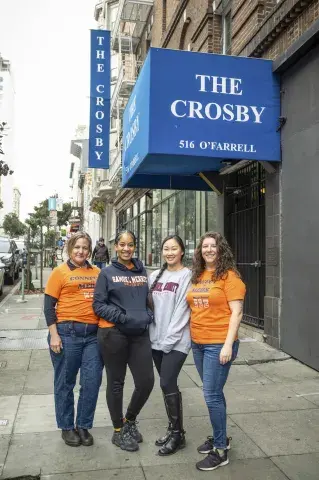
“The chronically unhoused and marginally housed experience health disparities related to their inability to refill prescription medications. Along with mental health issues, they have diabetes, cardiac and renal issues, and many other chronic health illnesses, so it was very daunting,” says Sibson-Tuan. Due to the College of Nursing’s long-standing relationship with Episcopal Community Services, which operates The Crosby and several other SROs in San Francisco, nursing students in their senior rotation at the Oakland Campus were perfectly positioned to provide support. Sibson-Tuan began to devise a pilot program to help new SRO residents in Berkeley make sure their prescriptions were either sent successfully to a nearby pharmacy or delivered directly to them. The program also confronted another problem that preexisted COVID-19 by decades: this population’s heavy and often avoidable reliance on expensive emergency services that congests overloaded emergency departments and mires first responders and their vehicles. “They weren’t close to their medications any more, so they were falling through the cracks and using emergency rooms or calling an ambulance when their meds ran out,” she says. Importantly, this program had the added benefit of providing clinical exposure for Samuel Merritt nursing students facing a COVID-19-caused dearth of community rotation opportunities.
READY, SET, CONNECT
Connect to Meds, Sibson-Tuan’s win-win-win solution, was ready to be put to the test. Out of 69 new residents at the hotel, 25 enrolled in the program, and among those that participated, no emergency services were used at all. “The residents were connected to the medications they needed, and our students had good clinical access experiences,” boasts Sibson-Tuan. “These learning opportunities strengthen the next generation of student nurses graduating from SMU by exposing them to lots of mitigation strategies for negative social determinants of health.” Armed with preliminary positive results from the Connect to Meds pilot program, Sibson-Tuan applied for and secured a coveted grant from the Scott Beamer Endowed Memorial Fund, which was established to stimulate and support SMU student and staff involvement in community service. In the fall of 2022, cash in hand, she reconnected with Episcopal Community Services with a new mission at the forefront: for SMU nursing students to connect the Tenderloin’s SRO residents to their medications.
GAP: BRIDGED
Still in the process of gathering data, Sibson-Tuan is hopeful that, once analyzed, the results will clearly demonstrate many positive results of the Connect to Meds program, leading to a statewide or even nationwide expansion. Regardless, she is certain that both SRO residents and SMU students have benefitted from the program. Although just 25% of the students responded in a pre-experience survey that they would be likely to work with this population in the future, that number doubled in the post-reflection survey. One inspired student claimed, “My time working with Episcopal Community Services and the residents gave me a deeper understanding of the ongoing issues that marginally housed persons face.” Sibson-Tuan says, “A lot of times nursing students believe that nursing happens in a hospital, but they need to realize that all of our hospital patients come from the community somewhere and need to understand the issues that they are going to go home to.”
CONNECTION ACCOMPLISHED
Back at The Crosby in late November, weeks after that fateful trip to urgent care, the nursing students returned to check in on their patient, who had since received more medical interventions and a new insulin regimen. They were overjoyed to find him in good spirits and better health. He was “alert and smiling, with a warmer complexion and a smoother gait as he walked down the hallway,” they said. With his blood sugar levels now regularly under 200, he reported “feeling great!” The students felt pretty great, too.
"With a new understanding of the complex obstacles our patients face, we can find the best ways to provide care that truly fits their needs, and educate and advocate for them." — Emilio Huerta-Ramirez
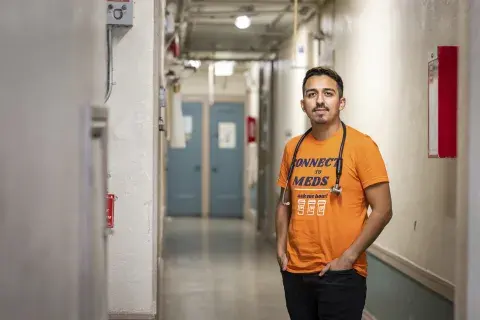
“This experience ignited an unwavering compassion, enabling me to connect with individuals on a profound level and be a crucial advocate on their behalf. I feel more equipped to embark on my journey as a nurse case manager.” — Chaena Mendoza
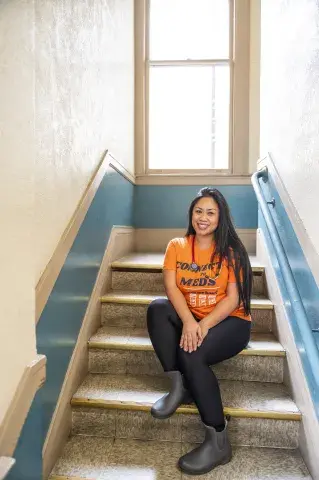
“Nursing students need to realize that all of our hospital patients come from the community somewhere and need to understand the issues that they are going to go home to.” — Assistant Professor Elizabeth Sibson-Tuan
